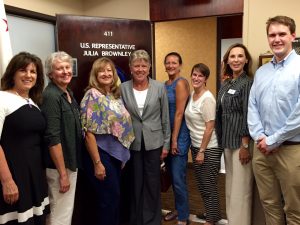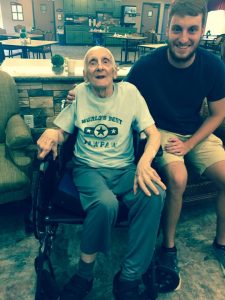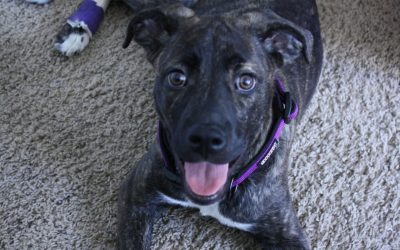I was privileged last week to participate in an intimate meeting with Julia Brownley, the woman who represents my area in Congress. It was an honor to be able to shake hands with Rep. Brownley and then sit down with five other women to discuss an issue that is near to our hearts: the true toll of Alzheimer’s disease and the battle against it.

Congresswoman Julia Brownley, center, listened to our stories of how Alzheimer’s has touched our lives.
All six of us have had up-close and too-personal experiences with Alzheimer’s, and all of us wanted to remind Rep. Brownley that this disease, which has no cure, affects more than 5 million Americans and puts enormous burdens on families. Brownley has co-sponsored legislation in Congress that will boost funding for Alzheimer’s research and provide more resources for families and health-care providers.
The six of us were representing the local chapter of the Alzheimer’s Association — and our loved ones who have suffered from the disease. We thanked Brownley for her support and encouraged her to keep fighting to make Alzheimer’s research and support a priority in Congress.
I was especially grateful for a chance to point out a popular fallacy about Alzheimer’s: that it is primarily a memory-loss disease. People who have not witnessed Alzheimer’s in a family member or close friend too often do not realize that confusion and memory loss — the disease’s most famous hallmarks — are just the early stages.
What Could Be Worse?
During the years that my dad was suffering with Alzheimer’s, people would often ask me if he still recognized me. I came to see the question as a mark of “Alzheimer’s innocence” — a sign that the person asking it didn’t know much about the disease. What could be worse, they seemed to be saying, than the day a loved one’s memory bank no longer contains you? But anyone who has seen the disease up close knows there is worse. Much worse.
As it progresses, Alzheimer’s robs its victims of far more than memories. It strips them of the ability to walk and talk, use a spoon or fork, digest food correctly, fight off infections, and — ultimately — even to swallow or breathe.
Many Alzheimer’s victims do lose their ability to recognize loved ones. My father did not. Although he could say very little, his eyes would light up in a way that left no doubt. My son Tyler was certain that his Papa recognized him last summer — even though he had not seen his grandfather in more than a year. But, as is obvious from this photo, my father had lost a lot more than his ability to recognize his family.
When we first left him in a memory care center, he had been physically strong, still able to read the Bible and a newspaper and play dominoes. But he couldn’t remember not to walk in front of cars or hug strangers at the mall or that my mother had been battling cancer and needed rest. In his five years in full-time care, he lost more than 50 pounds, his glasses, his false teeth, his ability to eat the foods he most loved, and most of his power of speech. A fall from his bed led to a broken hip; he never walked again.
My father lived only a couple of months past this visit with Tyler. In those last weeks, he battled mysterious fevers and unexpected seizures and struggled to eat, drink, sit up, or lift his head. Eventually, he could no longer swallow. As he entered those final stages of Alzheimer’s, I was surprised to discover how many people were surprised to discover how my father’s body was betraying him. They thought Alzheimer’s was just a memory disease.
Battling Misconceptions
Realizing how many people held that misconception helped me understand a little better why the battle against this disease has been so slow and why it has been so difficult to obtain funding for medical research or community support for caregivers. If you think the worst that Alzheimer’s will do is make you forget a name, then you may not believe it needs the attention given to illnesses like cancer or AIDS.
So, I was very glad to be able to give Rep. Brownley’s young staff members a more realistic picture of Alzheimer’s true toll. And as I related my thoughts in the congresswoman’s office, the Alzheimer’s expert witnesses sitting around the table all nodded in agreement. “No one ever died from memory loss,” one of them said. Yet Alzheimer’s disease currently has a 100 percent fatality rate.
My dad lost his fight with Alzheimer’s last October, but I’m not planning to quit fighting for more understanding of this disease, for more funding for research, for more support for caregivers, for better care for patients. And I am happy to know that my local congresswoman continues to fight for those issues too.



Thank you, Tammy, for posting this. The disease is terrible and so far incurable. I tried everything I heard of that was supposed to help halt the progress of the disease. Unfortunately, nothing worked. It is so hard to watch your once active and involved husband, or any loved one, slip away from you. He has been gone almost 10 months now, but, I still miss seeing his sweet smile and our almost 58 years together! I pray there will come a day in the near future when a cure can be found. Thank you for your involvement to try to find a cure.
Love you, Mom
Thanks, Mom. I’m glad you liked the post. This picture with Tyler was taken a year ago today. A lot has happened since then.
Thank you, Tammy, for this post. You are such a gifted writer!!
Thank you! Glad you liked it!